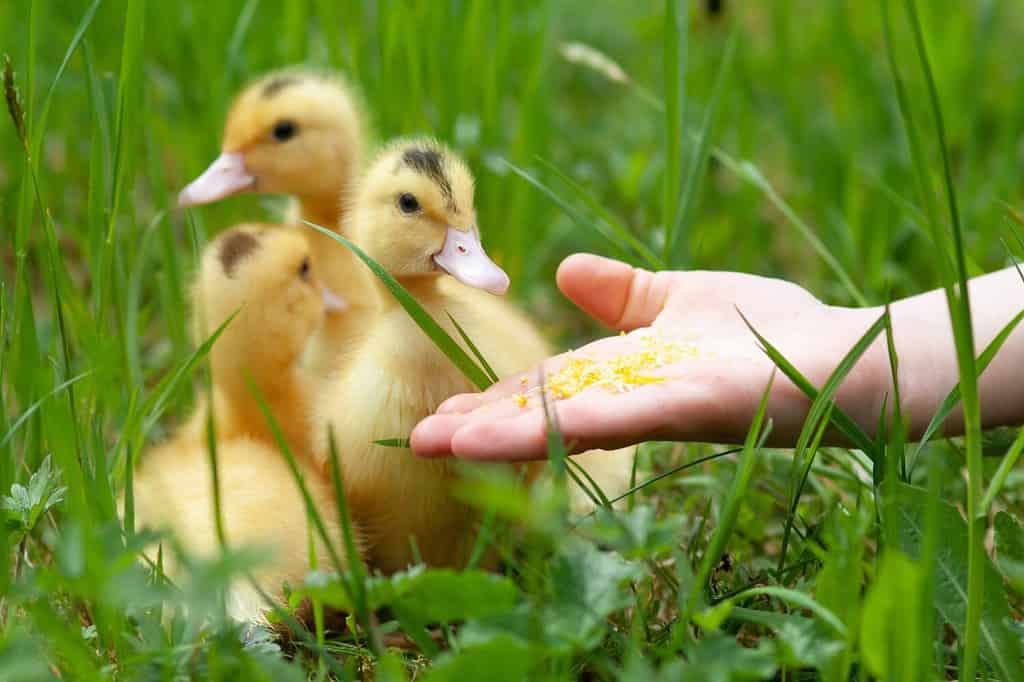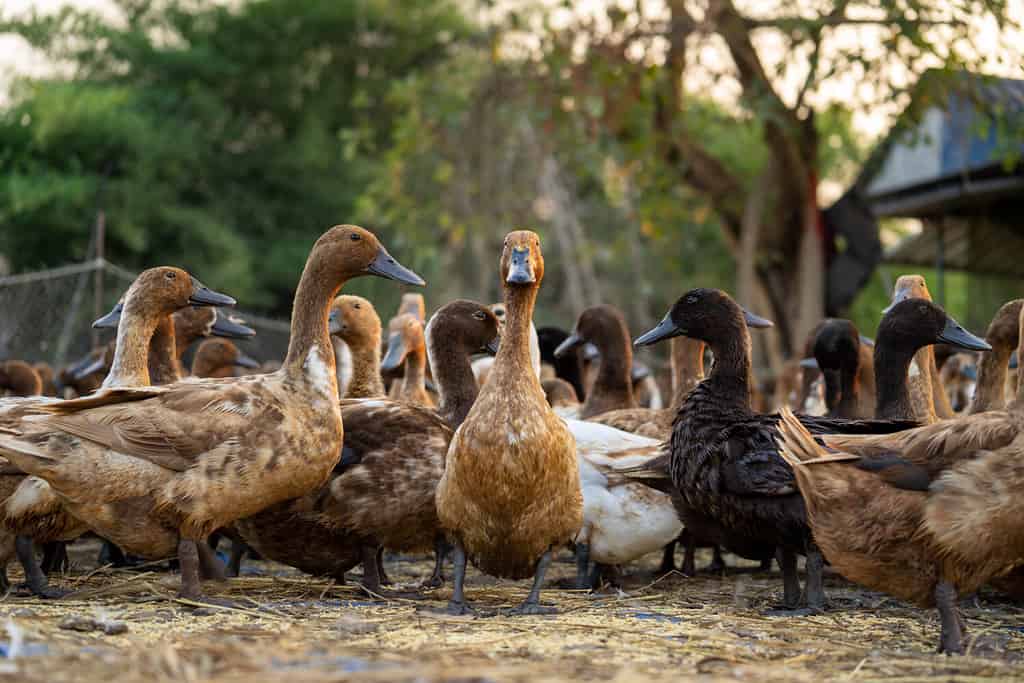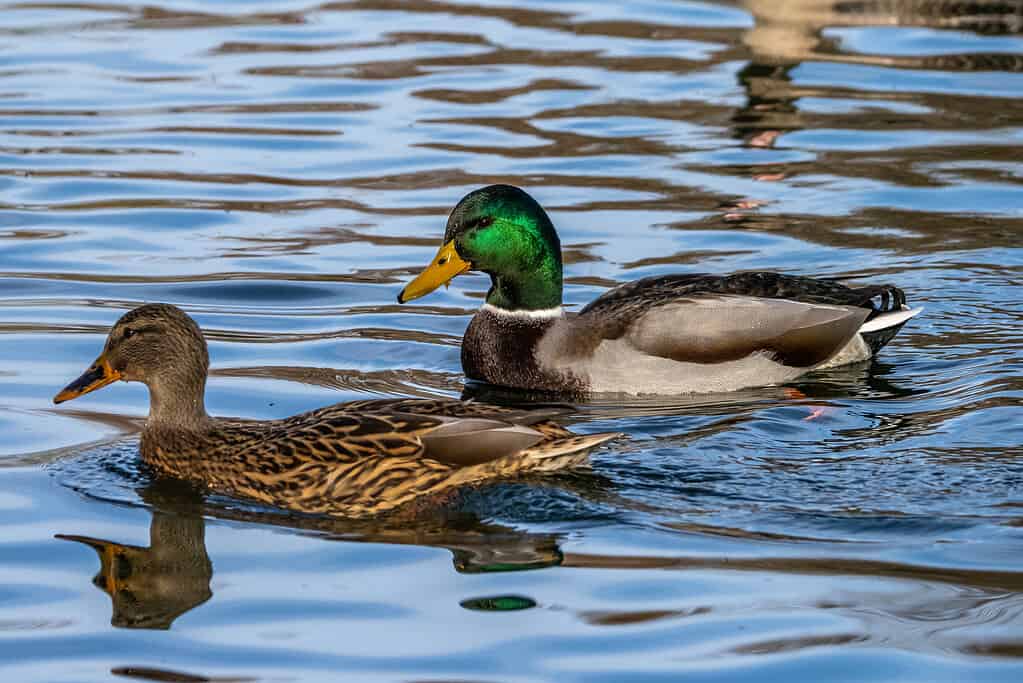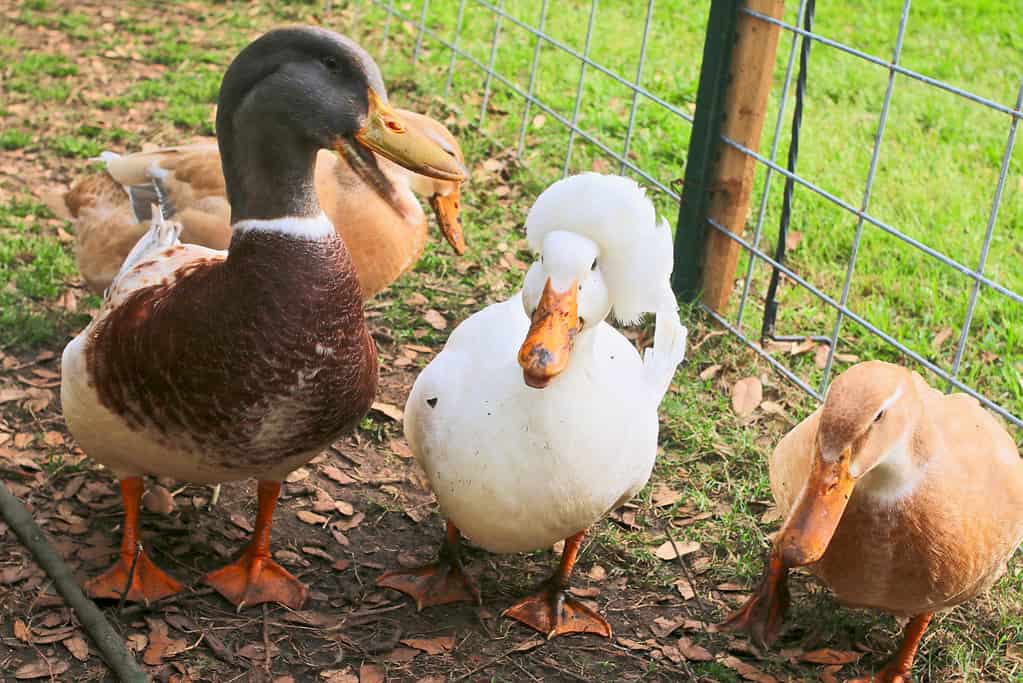When most of us think of intelligent birds, ducks usually aren’t the first species that come to mind. Most people likely imagine birds like parrots or crows. However, you certainly shouldn’t underestimate ducks when it comes to how smart they are! But how smart are they, and what do we know about ducks’ overall intelligence and behavior? Read on to learn more.
Are Ducks Smart as Babies? How Smart Are Ducklings?

The ability of a duck to imprint on another animal or object shows they are capable of surprisingly complex abstract thought.
©Andrii Zastrozhnov/Shutterstock.com
Interestingly, several studies have been conducted on ducks’ overall behavior and intelligence, even from a young age. From birth, they are surprisingly intelligent and, in some ways, outperform animals like dogs and cats cognitively and behaviorally. They’re even capable of abstract thought, which they use to navigate their surroundings with the help of complex social and environmental cues.
For example, one study on the intelligence of ducks conducted by Edward A. Wasserman, published in Science Volume 353, Issue 6296 2016, showed that ducklings could identify their mothers using abstract thought just minutes after birth. The fact that they can imprint on a moving object or animal so quickly shows their early intelligence is nearly on par with that of young primates.
Ducklings understand abstract concepts like “sameness” and “differentness” very quickly. Researchers once believed ducklings essentially had a very literal image of their mothers in their heads upon imprinting. They thought ducks used this single, simple image to navigate and locate their mothers.
However, another recent study on duck intelligence, also published in Science Volume 353 conducted by Antone Martinho III and Alex Kacelnik, found the method ducklings use to locate their mothers is much more detailed and abstract than just a simple concrete image.
By introducing ducklings to different moving objects of differing shapes and colors, the study found ducklings understand the difference between these unique colors and shapes. For instance, they would imprint on and follow the red pyramids if introduced to two red moving pyramids. However, if the objects differed, such as a blue cylinder and a green cube, the ducklings would similarly imprint on and follow those objects, too. This shows the ducks understand the differences between colors and shapes!
In short, ducks are remarkably intelligent from birth! But are they also as intelligent as adults and in general? Interestingly, yes, and for several reasons.
Ducks Use a Wide Range of Foraging Behaviors

Ducks are highly resourceful and will alter their behavior depending on their surroundings.
©SIM ONE/Shutterstock.com
Additionally, ducks are incredibly resourceful on top of being capable of highly abstract thinking. One key factor in ducks’ overall intelligence is their ability to use different foraging behaviors to locate and obtain food. As omnivores, they eat various foods, from insects and invertebrates to seeds, grasses, and nuts.
One study by the University of Kentucky’s biology department in 2022 showed how diverse ducks’ foraging abilities are. Essentially, different species of ducks have differently shaped beaks, which can be helpful in other foraging behaviors.
Some of these behaviors include diving, sieving, grazing, and dabbling. This makes their beaks something like a Swiss army knife when obtaining food. Ducks are smart enough to adapt their behavior depending on the situation. For example, they may dive to get fish or invertebrates and graze to obtain seeds and grasses. But they also will use their feet, wings, and flexible necks to dig, graze, and forage for food. Overall, this makes them surprisingly resourceful when it comes to feeding.
Ducks Change Their Behavior Based on External Factors

Weather conditions, time of day, overall geography, and the presence of other humans and animals all affect the behavior of ducks.
©iStock.com/Rudolf Ernst
Additionally, ducks alter their behavior depending on external factors. Another study published in Animals in 2022 by Camille Munday and Paul Rose extensively studied the behaviors of free-living ducks at a large park in London, UK. They found that stimuli and factors like the weather, the presence of humans and other animals, temperature, time of day, and even the structure of surrounding vegetation all played a significant role in their behavior.
For example, the ducks were more vigilant during rainy weather and foraged less. Interestingly, they seemed to be habituated to the presence of human visitors to the park. The number of visitors did not have a significant effect on their behavior. Interestingly, this implies ducks can become used to and even comfortable with the presence of humans. They will even frequently visit areas where humans have fed them previously.
The study also found that wild ducks tend to spend their time differently than captive ducks when allowed to explore, graze, and interact more with their surroundings. This means they are more social and active than researchers once believed.
Ducks Use a Wide Range of Vocalizations to Communicate

Ducks can utilize various vocalizations and behaviors to communicate with one another.
©Hayley Crews/Shutterstock.com
Another interesting behavior often observed in ducks is their wide range of vocalizations for different situations. For example, they are capable of warning calls, mating calls, and even specific vocalizations mothers use to interact with their young. Ducks are also notably highly sexually dimorphic, and both sexes have distinct calls used for courtship and interacting with each other.
And ducks use their beaks in surprisingly diverse ways to communicate with one another. This makes them highly social. Another unique example is a call used by male mallards. Rather than vocalizing, the male will rub his beak along his flight feathers to make a “rattling noise” towards his mate. The exact meaning of this behavior is unknown. However, it is most likely used between mates to strengthen their bond.
Ducks Form Social Hierarchies

Wild and captive-bred ducks form elaborate “pecking orders” and know their roles within these hierarchies.
©S. Mathews/Shutterstock.com
Like many birds, ducks are socially intelligent enough actually to form elaborate social hierarchies with one another. Male ducks are particularly territorial and protective of their mates and resources.
Muscovy ducks, for instance, have a rather strict social hierarchy or “pecking order” amongst themselves. Male muscovies fiercely defend their perceived territories! They use a wide range of visual displays and, as mentioned earlier, vocalizations to intimidate and scare off other males from their territory. Within each territory, one or a few dominant males usually mate and nest with females. Other males in the area often live as bachelors or potential competitors.
But female ducks also play a role in this pecking order, too. Females help to build and maintain nests and keep their young safe while their mates defend their territory.
Additionally, many hobby farmers note domesticated ducks are great about co-existing with other farm animals. This implies ducks are intelligent enough to recognize and potentially even bond with other animals, understand whether or not they are a threat, and understand that existing alongside them can be beneficial for securing food and shelter.
How Smart Are Ducks Compared to Other Birds?
While they aren’t quite as intelligent as birds like corvids or parrots, ducks are overall surprisingly intelligent. They are capable of elaborate displays, vocalizations, and even abstract thought shortly after birth. Rather than just picturing a concrete image of their mothers, as mentioned above, ducklings understand the difference between different shapes, objects, and colors very early on.
Furthermore, although they can’t recognize themselves in a mirror, like some birds, ducks can form strong bonds with one another, particularly with their mates. Additionally, rather than selecting one mate for life, ducks choose new mates regularly. They often like mates based on their physical health to pass healthy genes onto their young. They’re also highly territorial and protective of their young. They will even alter their behavior depending on external factors.
Finally, ducks are also incredibly resourceful and skilled at using their bodies in different ways to obtain food and other resources. They can use their beaks, wings, and feet to interact with their surroundings and graze for live food and vegetation. As we also covered earlier, they utilize different tactics based on the type of food they’re searching for.
Overall, ducks are brilliant despite not being as bright as a handful of other bird species. More research is undoubtedly required to fully and comprehensively understand duck intelligence, but what we know for now is incredibly enlightening.
The photo featured at the top of this post is © iStock.com/Rudolf Ernst
Thank you for reading! Have some feedback for us? Contact the AZ Animals editorial team.







